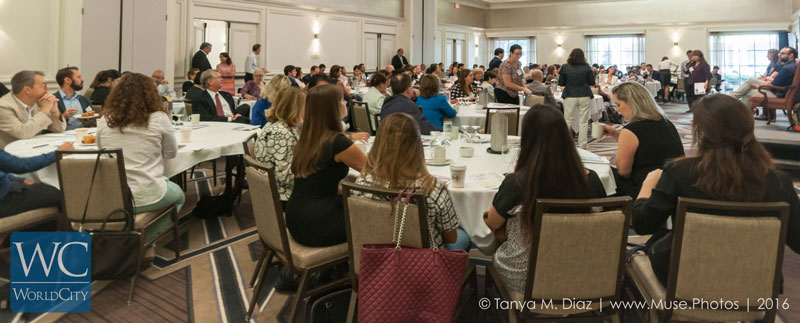Social media secrets from those in the know
Social media is no longer just a way for friends and family to keep in touch, or for like-minded hobbyists to form communities. It’s now seen as a crucial corporate tool, though not every company has found its social media footing. And it doesn’t function the same in every country.
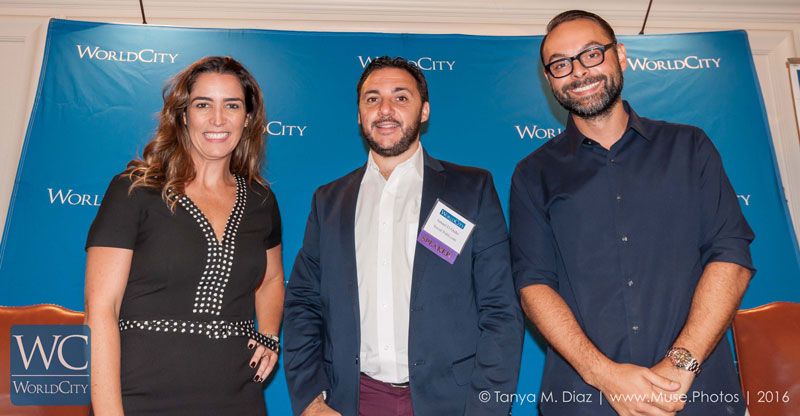
Adriana Grineberg/Facebook, Ismael El-Qudsi/SocialPubli.com, Marco Botero/Twitter
That was the message from three in the trenches: Adriana Grineberg, regional director for Facebook in Latin America; Ismael El-Qudsi, CEO at both social marketing platform SocialPubli.com and its parent, Internet República; and Twitter’s Marco Botero, who leads a team focused on developing media solutions for brands.
The trio lead a panel discussion titled “Social Media: Strategies that are working,” at WorldCity’s Global Connections event held Sept. 30, 2016, in Coral Gables.
Because they all work or have done work in Latin America, the discussion began with a look at the region’s social media culture.
“What is the chief obstacle to social media growth in Latin America?” asked WorldCity CEO Ken Roberts.
It was agreed: Tech infrastructure and the cost of access create headwinds. “This is the main issue,” said El-Qudsi. What’s more, he added, companies have to realize that, though Spanish is the common language across most of the region, the culture isn’t monolithic. Users in Mexico and Colombia tend to stay polite in their comments, while discussions are more free-wheeling in Chile, for example.
Expansion in Latin America, Miami
“Twitter has been on an exciting ride in the last year and a half,” said Botero. The company opened both a Miami office and a Mexico office in June, and is moving past its iconic 140-character text format to let users post multimedia content. “Video is driving much of that experience from our users,” he said. Especially popular is live-streaming format, Periscope.
Big drivers in Latin America usage include events like the Copa America soccer tournaments, the  Brazil-based 2016 summer Olympics, as well as what people are experiencing in Venezuela’s economic crisis.
Brazil-based 2016 summer Olympics, as well as what people are experiencing in Venezuela’s economic crisis.
“We are different; we are completely public, and live,” Botero said, noting one can follow President Barack Obama and see how he interacts on Twitter. “Eighty percent of world leaders are on Twitter.”
Facebook is also witnessing user changes. “Now we see video as the most shared kind of content,” Grineberg said. Facebook has four Latin America-focused offices: in Brazil, Argentina, Mexico and Colombia, along with a Miami-based office for the region. Facebook was originally text only, then pictures could be loaded. The amount of content people are posting is exploding. “This is so impactful,” she said. “Brands are a bit behind in the content they are creating.”
Well-made content, she said, will have social media users not knowing – or caring – if the post comes from an individual or a company. “What matters is that the content is interesting to me.”
Companies onboard
How, asked Martin Enriquez, CEO and co-founder of social media analytics firm Socialmetrix, “do you see brands and social enterprises using social media,” from a research and advertising point of view?
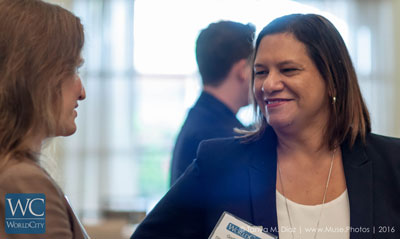
Stanley Black& Decker
“I think it is more apparent at the moment in the U.S.,” Botero said. Brands come to Twitter to build a relationship with consumers. “To put their message in the relevant environment.” He said that every two days, one billion Tweets are generated.
Some companies are also using the Direct Message function of Twitter – which can be private – to respond to customer needs that are first expressed through the open platform.
Twitter, said El-Qudsi, has become the company for customer support, and Facebook for advertising. Use of Instagram and similar services is increasing, he said, because at the end of the day, people enjoy showing off what they are doing and experiencing.
Even so, Grineberg sees something different in Facebook use. “You are there with your friends, your family, the people you like the most.” In fact, she said, the “love” icon is most used in the Facebook icon family.
Considerations to ponder
“What are the common mistakes companies make when they are trying to reach stakeholders?” asked Evan Owen, communications and protocol manager for the City of Doral.
Not replying to people after they ask a question on social media or reach out. “The thing is to have a relationsh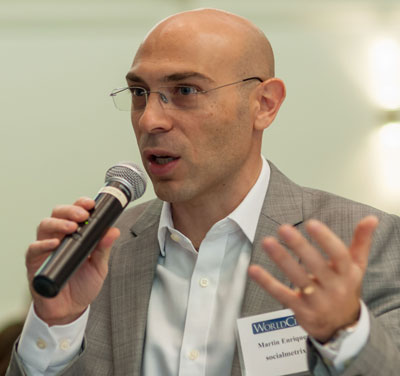 ip with customers,” Grineberg said. “If they called, you would answer the phone.”
ip with customers,” Grineberg said. “If they called, you would answer the phone.”
Meanwhile, the problem El-Qudsi he sees the most is companies relying too much on social media as a sales tool. “They don’t sell, they oversell,” he said. The worth of the product “is for the customer to decide.”
A lot of brands fear engaging in online conversations, Botero said. “If they are talking badly about you, it’s an opportunity.” Listen to what customers are saying, he said, they probably know more about the products than you do. And his advice: “Be authentic.”
Staying ahead of the curve
“In terms of keeping up, do you have any general advice on how to stay current?” asked Dickie Davis, director of public and customer relations at Miami International Airport.
“Think about your business first,” not social media itself, Grineberg said. At the end of the day, she said, Facebook is about supporting companies. Still, companies first must have goals set. “Then, you need to find a way to get the right content to the right people.”
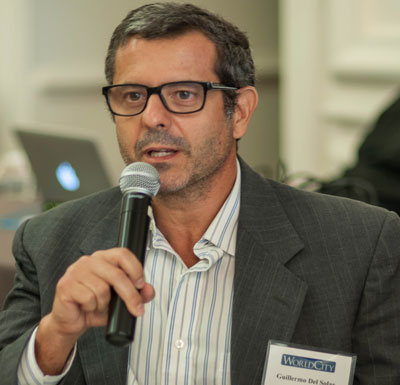
Guillermo Del Solar Consulting
Botero said his first piece of advice is to take advantage of the free tutorials on Facebook and Twitter and to commit to understanding the platforms.
“Companies say they don’t want to be on social media,” said El-Qudsi. “You are already on social media. The important thing is that your company has a social DNA.”
Where, asked Guillermo Del Solar, founder and president, Guillermo Del Solar Consulting, do you see Facebook going in the coming years?
“Tech is going to advance, but the heart of the thing is that people like to communicate with each other,” Grineberg said. Still, she said, get ready to get comfortable talking to machines. Advances in robotics means we will all be interacting more with computers.
Global Connections is one of four event series organized by WorldCity to bring together executives in greater Miami on international business topics. The Global series is sponsored by the Florida International University’s College of Business and Audicom Productions.
The next Global Connections, “Latin America & e-Commerce: Innovations Galore,” is set for Oct. 21.
